
Saturday 5 September 2020 is the centenary of Great Britain’s gold medal win at the 1920 Antwerp Olympic Games and this anniversary is being marked by a very special event at The Hockey Museum in Woking on Centenary Day.
Extensive research by a group of volunteers at The Hockey Museum over the last five years on Great Britain’s (GB) player history has produced a record of 366 men and 210 women who have represented GB since the first official international matches. The research concluded that the 1920 team was the first to represent Britain and Harry Haslam, as the goalkeeper, is designated as men’s player No. 1 and his family will receive his GB cap at a presentation ceremony at the Museum on the Centenary Day.
Each of the other players, including those no longer alive and former living internationals, will receive their cap during the coming year, the deceased via their families. It is planned that current GB central training squad members will receive theirs during Great Britain’s home FIH Pro League games next May.At the Antwerp Games, where only four nations competed, GB’s route to the gold medal took a late controversial final turn. After victories over Denmark (5-1) and Belgium (12-1) the gold medal was secured by a walkover against France.
Born in Aston, Birmingham in 1883, Harry Haslam first played hockey in the Midlands including representing Worchestershire before moving to Essex in the early part of the 20th century. After two seasons with the Guildhall club he moved to Essex where he joined Ilford HC, staying with them for 18 years until returning to Guildhall in 1929.
He won his county cap for Essex in 1911 and was appointed honorary secretary in the same year. He went on to captain the county and never missed a game for them for over 12 years from his debut. He also represented the East and in 1920 made his England debut aged 37.
He won nine international caps, seven for England and two for GB (Antwerp Olympic Games), the last against Scotland in March 1921.His style of play was apparently on a par with his ability to hold his drink and he was noted for his eccentricity on the pitch. The Ilford Recorder in an article on a game in December 1912 reported that Haslam “made several brilliant saves but, for some unaccountable reason, accompanied each effort with a ‘whoop’ like a proverbial scalp hunter.”
During his playing career he was a hockey correspondent for the Chelmsford Chronicle and then the national News Chronicle as well as the regular hockey expert on BBC Radio. In 1922 his book How to Play Hockey was published.
He retired from playing hockey at the age of 48 in 1932 but continued to be active within the game in various administrative roles and as a prominent umpire.
During World War One Haslam served as a Chief Inspector with the Metropolitan Special Constabulary and in 1920 he received an OBE for his services to the Constabulary.
He died at home on his 72nd birthday.
